As a business owner looking to build a website, you've likely heard of WordPress, a popular platform used for creating websites. So popular that it powers 43% of all websites. However, does this popularity mean it is the best for your project?
In this article, we'll explore both WordPress and a very different approach to building a website with the Laravel framework, helping you understand which might be the best fit for your business needs.
Laravel vs. WordPress: Overview
To put it simply, you can think about WordPress as a Lego set - you can build what the creator meant it to be with some possible variations. On the other hand, Laravel is a set of toy blocks with many adjustable details enabling you to build whatever YOU want.
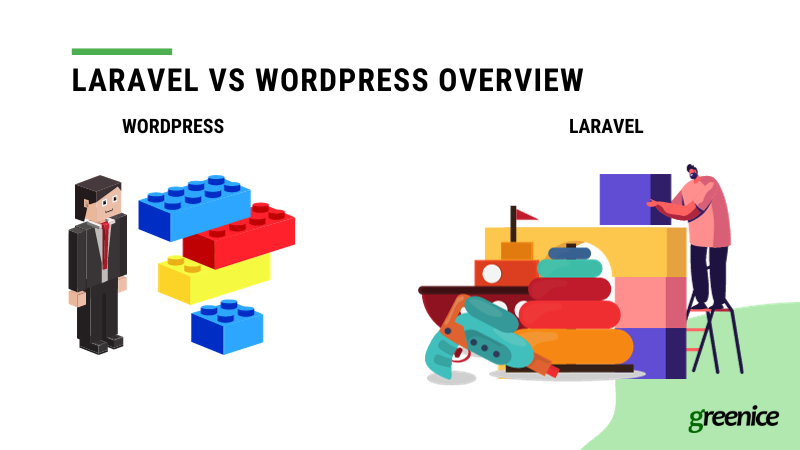
Now, let’s explore these options more explicitly.
What is WordPress?
WordPress is a popular open-source content management system (CMS) used primarily for creating websites and blogs. It is a pre-built construction that you can use to quickly set up a website.
Here are some key aspects of WordPress:
- Is known for its simplicity and user-friendly interface, making it accessible to users with varying levels of technical skill.
- Offers themes and plugins to customize websites according to users’ needs. Themes control the visual appearance of the website, while plugins add functionality.
- Provides tools for creating, editing, and managing digital content. It supports different types of content like posts, pages, and media.
- Is open-source and offers some free designs.
- Has a vast community of users and developers, providing extensive support through forums, tutorials, and guides.
WordPress is known for its ease of use, and a large selection of themes and plugins, making it a popular choice for individuals and businesses looking to build and manage websites without needing extensive technical knowledge.
What is Laravel?
Laravel is a PHP web framework, created for developers to speed up and improve web app development. Just like WordPress, this tool is intended for the custom development of websites and web apps. The main difference is that WordPress is a ready-to-use CMS and Laravel is a tool you can build a CMS with.
Some of the key features of Laravel include:
- Is geared towards developers with a good understanding of web development principles.
- Offers strong security features such as protection from SQL injection, cross-site request forgery, and cross-site scripting.
- Suitable for complex, large-scale applications.
- Extensive flexibility for custom features and functionalities.
- Optimized for efficiency and speed, especially in handling large volumes of data and traffic.
Laravel is known for its elegant syntax, and it aims to make the development process a pleasing one for developers without sacrificing application functionality. It's the most popular PHP framework and is known for its ability to simplify tasks like authentication, routing, sessions, and caching, making it a good choice for developing robust and modern web applications.
Below, we will compare both WP and Laravel in detail to help you understand what tool suits your project better.
Laravel vs. WordPress: Cost
When considering the cost of building and maintaining a website, it's crucial to understand how the choice between Laravel and WordPress can impact not only your budget for set up and launch, but also ongoing maintenance costs.
.png)
WordPress: Cheaper and Faster Initial Setup
Since WordPress is a ready-to-use CMS system that is free, it is easy and cheap to set up a website with it. This CMS has an extensive library of free themes and plugins. This allows for considerable customization and functionality without additional costs. However, premium themes and plugins can be quite expensive.
WordPress's user-friendly interface means that non-technical users can set up and manage their websites without needing professional developers, reducing initial costs.
Sounds fantastic, right? Not really, because there is always a catch. WordPress is cost-effective for basic needs, but costs can escalate if extensive customization or premium plugins are required.
Also, reliance on multiple plugins leads to higher maintenance costs and worsens security vulnerabilities, which we cover in greater detail below.
Laravel: Longer and More Expensive Initial Setup
For larger, more complex projects, Laravel may offer a better long-term economy. Although the initial development cost with Laravel is typically higher due to the need for skilled developers, its efficiency in handling large-scale applications can lead to reduced server costs and better resource management.
Laravel's framework is designed for custom development, which means you're investing in tailored solutions rather than adapting pre-built options. This can result in a more efficient system, with less bloat and more relevant functionality.
Over time, Laravel's structured and scalable nature can result in lower maintenance costs. Its robust architecture makes it easier to update, scale, and enhance, avoiding the potential pitfalls of WordPress sites that become unwieldy as they grow and evolve.
However, there is a way to reduce development costs for Laravel!
Reaping the Benefits of Laravel at Lower Cost
Pre-made options can be valuable for saving both time and money in development, offering a practical approach to bridge the cost difference between WP and Laravel. There are mainly two types of solutions to consider:
- Scripts - There are ready-to-use Laravel scripts that serve as excellent starting points for website or app development. A prime example is the LaraClassified script, designed specifically for creating classified ad platforms. These scripts provide a foundational structure, significantly cutting down on development time.
- CMSs - Customizable content management systems (CMSs) based on Laravel offer flexibility and speed in website creation. An example is October CMS. It’s adaptable, supporting different data storage systems, and simplifies content management for users. Offering a range of features like user management, customization options, and additional functionalities, it's often seen as a Laravel CMS like WordPress, but with the added robustness and flexibility.
Laravel vs. WordPress: Ease of Use
The ease of use of a website platform is a crucial factor, especially for business owners who may not have extensive technical expertise. WordPress and Laravel offer distinctly different user experiences in this regard, catering to different skill levels and needs.
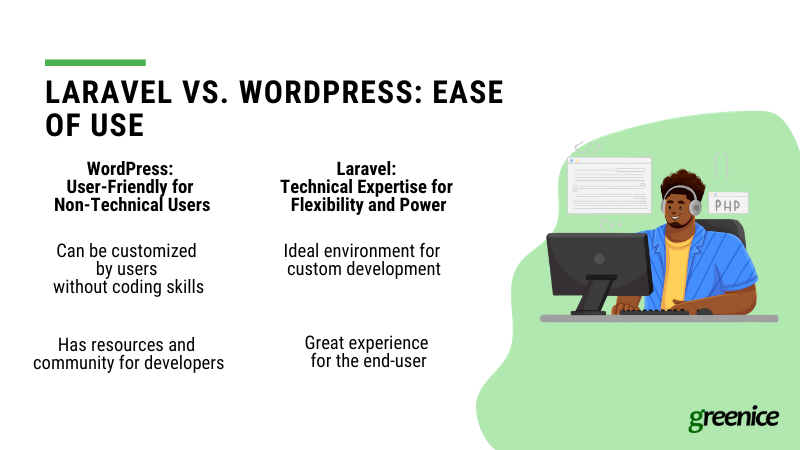
WordPress: User-Friendly for Non-Technical Users
WordPress is known for its straightforward, intuitive user interface. Its dashboard is simple to navigate, making tasks like posting content, installing themes, and adding plugins accessible even to beginners.
For Users: WordPress is renowned for its user-friendly interface, making it ideal for non-technical users who are searching for basic features. The dashboard is intuitive, simplifying tasks like content creation, theme installation, and plugin management. With its point-and-click interface, users can easily customize their site or create landing pages without needing coding skills. However, as the website complexity increases, some issues may arise.
For Developers: WordPress offers a straightforward environment to work in. Its popularity means a wealth of resources and a large community for support. Developers can leverage thousands of themes and plugins, reducing the need for extensive coding while still allowing customization.
Laravel: Technical Expertise for Flexibility and Power
Laravel requires a good grasp of programming concepts. It's not as immediately accessible as WordPress and generally requires at least a basic understanding of PHP, web development principles, and MVC architecture.
For Developers: Laravel provides a robust, flexible environment ideal for custom web application development. Although it has a steeper learning curve, it offers more power and flexibility, along with a strong set of tools for complex functionalities. Its active developer community and comprehensive documentation are valuable resources for skilled developers.
For Users: Laravel, being a more advanced framework, is less user-friendly for non-technical users compared to WordPress. It requires a basic understanding of web development concepts, which can be a barrier for those without technical experience. However, the end-user will not notice any difficulties using Laravel-powered apps or websites.
Laravel vs. WordPress: Security
Security is a vital concern for any online platform, and both Laravel and WordPress approach this issue differently. Understanding these differences is crucial for business owners when deciding on the right platform for their website or application.
Laravel: Robust Security from the Ground Up
Laravel is fundamentally structured with security in mind, primarily because its source code is only accessible to clients and developers. This exclusivity makes Laravel websites less vulnerable to hacking, as attackers find it difficult to breach the unique code. In contrast, WordPress sites, with their more uniform code, are often targeted for bulk hacking.
Laravel’s architecture inherently guards against common security risks such as SQL injection, cross-site request forgery, and cross-site scripting. Laravel handles these security aspects automatically, providing a strong foundation for a secure application.
Due to its nature as a framework, Laravel allows for more fine-tuned security measures. Developers can implement specific security protocols tailored to the application's needs, offering a higher degree of protection, especially for custom-built functionalities. Laravel is updated regularly with security patches and enhancements. While this requires developers to keep the framework updated, it ensures that the platform remains secure against emerging threats.
Since Laravel is used for custom development, there's less reliance on third-party packages compared to WordPress. This minimizes the risks associated with vulnerable plugins or themes.
WordPress: Vulnerable
As the most widely used CMS, WordPress also seems to be the most vulnerable one. According to the Sucuri report, 96% of infected websites use this platform. And we were one of them. Long story short - initially built on WP, our site was hacked just a month post-launch.
One of the most significant security issues with WordPress arises from the use of third-party plugins and themes. While these extend the functionality of the site, they can also introduce vulnerabilities, especially if they are not kept up-to-date or are poorly coded. This is exactly how our website was hacked - because of the theme.
WordPress requires regular updates, including the core platform, themes, and plugins. Neglecting updates can leave a site vulnerable to security breaches. Additionally, the reliance on numerous community-developed plugins and themes can lead to inconsistent security practices.
Security issues are arguably the most significant drawback of WordPress, often overshadowing any advantages the system may offer.
Laravel vs. WordPress: Performance
Performance is a critical aspect of any website or web application, as it directly impacts user experience and search engine rankings. Laravel and WordPress offer different performance capabilities, especially when it comes to handling complex and large-scale websites.
Laravel: Optimized for Efficiency and Speed
Laravel is designed to efficiently handle complex, data-intensive web applications. Its architecture allows for optimized data handling, reducing the load time and improving the overall speed.
This framework includes special features that help websites run faster and more efficiently. It comes with tools like Memcached and Redis, which are particularly good at speeding up websites that handle lots of data.
One of Laravel's standout features is its Eloquent ORM. This is a sophisticated way of working with databases. It makes it easier and quicker for the website to fetch and manage the data it needs, performing better than older methods.
Additionally, Laravel uses middleware. Think of it as a gatekeeper that checks and manages the data requests coming into your website. This helps the website to avoid unnecessary work, especially for tasks that aren't needed all the time, thereby enhancing overall performance.
WordPress: Performance in Standard Sites
WP often struggles in the ‘WordPress vs Laravel speed battle’, even for smaller, basic websites. While users might tolerate this sluggishness, these sites typically fail to meet Google's standards for core web vitals, potentially harming your Google rankings. The issue is more pronounced for websites with large databases, such as marketplaces, where slow loading times can deter potential buyers. Consequently, this can lead to diminished sales outcomes, if not a complete lack of sales.
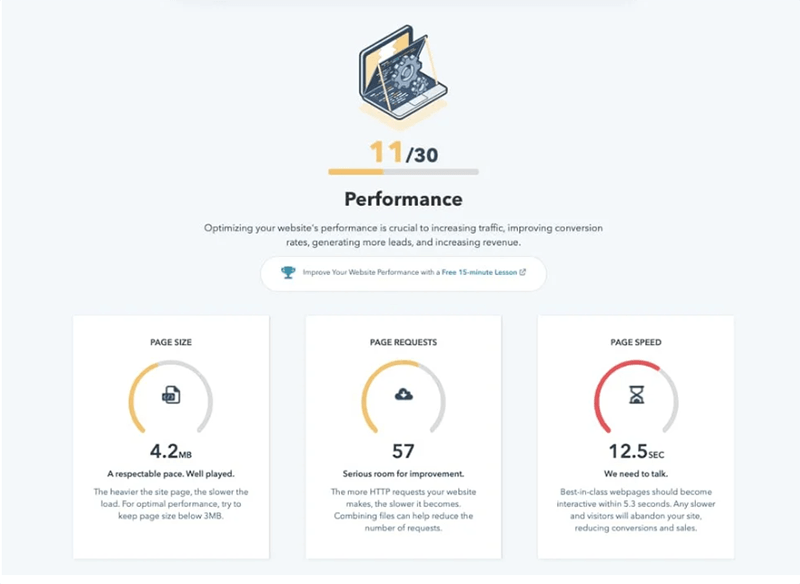
The more plugins and custom themes added, the more likely it is to encounter slowdowns. This is particularly evident in sites with a large number of plugins, as each plugin can add additional load time.
WP uses a less efficient database query system compared to Laravel's Eloquent ORM. For sites with a high volume of content or user interactions, this can lead to slower database queries and increased load times.
The performance of a WordPress site is also heavily dependent on the quality of the plugins and themes used. Poorly coded plugins or themes can significantly degrade site performance.
Laravel vs. WordPress: SEO
Website performance is not all there is to SEO, so let’s continue this topic further. Search Engine Optimization is vital for any website's visibility and success. Both Laravel and WordPress offer capabilities for SEO, but they approach it in different ways, catering to different levels of expertise and customization needs.
WordPress: User-Friendly SEO for Beginners
WordPress is often praised for its SEO-friendly plugins like Yoast SEO, which assist beginners with content optimization. However, it's worth noting that such features are not exclusive to WordPress and are commonly found in many CMS platforms.
The SEO tools integrated into its themes and plugins, such as clean URLs and mobile responsiveness, are standard across modern CMSs.
While WordPress's heritage as a blogging platform might offer some ease in content SEO and organization, this is a characteristic shared by numerous other platforms.
Also, the substantial WordPress community provides ample SEO resources, a beneficial aspect for beginners, but similar support is widely available across various CMS communities.
Laravel: Customized SEO Strategies for Advanced Users
Laravel offers more control and flexibility for implementing SEO strategies. Since you're building most features from scratch, you can tailor every aspect of your website's SEO, including URL structure, metadata management, and content rendering.
With Laravel, developers can implement complex technical SEO strategies that might be challenging to execute in WordPress. This includes detailed control over aspects like site speed optimizations, advanced caching, and customizing how content is served.
Laravel's architecture makes it easy to integrate with various SEO tools and platforms through APIs. This can allow for more sophisticated SEO strategies, like dynamic content optimization based on user behavior or integrating with advanced analytics tools.
Unlike WordPress, Laravel doesn't rely on plugins for SEO, which can sometimes add bloat and slow down websites. This lean approach can result in faster load times, a key factor in SEO.
Laravel vs. WordPress: Scalability
Scalability is a critical factor for any growing website, affecting its ability to handle increased traffic and expanding content without degrading performance. Laravel and WordPress offer different scalability capabilities, suited to various types of web projects.
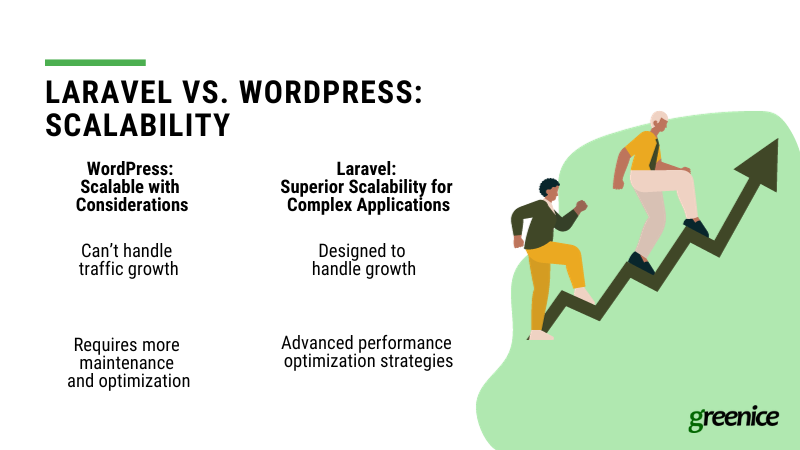
Laravel: Superior Scalability for Complex Applications
Laravel's architecture is inherently designed to handle growth and scale efficiently. It's well-suited for applications that anticipate a significant increase in traffic or data over time.
This framework allows for advanced performance optimization strategies, such as queue systems for background processing, efficient database indexing, and sophisticated caching mechanisms. These features enable Laravel applications to handle large volumes of traffic and data without a significant performance hit.
Since Laravel applications are custom-built, they can be tailored to scale in specific ways that match the unique needs of the project. This could involve optimizing database interactions, integrating with cloud services, or employing load-balancing techniques.
Laravel's efficient handling of resources means that as your application grows, it can maintain performance without necessarily requiring proportional increases in server resources. This can be more cost-effective in the long run.
WordPress: Scalable with Considerations
WordPress is not as scalable and can’t fully support large websites. It is not as seamless as Laravel, especially for highly customized sites or those with a large number of plugins.
Scaling a WordPress site often involves upgrading hosting solutions, such as moving to a dedicated server or a cloud-based solution. This can increase the cost and complexity of scaling.
The use of multiple plugins and themes, while beneficial for functionality, can become a bottleneck as a site grows. Each plugin adds to the load time and server resource requirements, potentially impacting performance under high traffic.
As a WordPress site grows, it requires more maintenance and optimization to maintain performance. This includes regular updates, database optimization, and possibly implementing a Content Delivery Network (CDN) and caching solutions.
Laravel vs. WordPress: Reliability
Reliability in web platforms pertains to the consistent performance and uptime of a website, a crucial factor for any business's online presence. Laravel and WordPress offer different advantages depending on the scale and complexity of the application.
Laravel: Enhanced Stability for Large-Scale Applications
Laravel is designed to handle complex applications reliably. It provides a solid foundation for building stable, high-performance web applications. This robustness is particularly beneficial for large-scale applications, where stability is paramount.
Laravel includes sophisticated error and exception handling, which is vital for maintaining a stable application. This feature ensures that unexpected issues are managed efficiently and do not lead to significant downtimes.
This framework facilitates automated testing, which is crucial for ensuring the reliability of an application. Regular, automated testing can quickly identify and address potential issues before they affect users, contributing to overall application stability.
Since Laravel applications are often custom-built, they typically have less reliance on third-party plugins or themes, which can sometimes be a source of instability. This control over the codebase helps in maintaining a consistent and reliable application.
WordPress: Quite Vulnerable and Unreliable
Despite its popularity, WordPress's reliability is questionable, particularly due to its reliance on plugins and themes. Even basic sites require these add-ons, which vary widely in quality. Poorly coded or outdated plugins and themes can significantly compromise a site's security and stability.
While the vast WordPress community offers support and regular updates, these measures often fall short in fully addressing the vulnerabilities introduced by third-party components.
Additionally, optimal performance hinges on high-quality, WordPress-specific hosting, adding another layer of dependency.
In short, WordPress's reliability heavily depends on external factors, making its stability a less certain proposition.
Laravel vs. WordPress: eCommerce
eCommerce functionality is a vital consideration for many businesses establishing an online presence. Both WordPress and Laravel offer avenues for building eCommerce platforms, but they cater to different needs and levels of customization.
WordPress: Offers WooCommerce Plugin for eCommerce Sites
WordPress users often turn to WooCommerce plugin for their eCommerce needs. It seamlessly integrates with WordPress, providing a comprehensive solution for online stores. At the same time, the Sucuri report says that WooCommerce-powered sites are most likely to be hacked.
The abundance of plugins available to enhance WooCommerce functionality adds to these security concerns. Each plugin, whether for payment processing or inventory management, can potentially introduce new security weaknesses.
Similarly, while numerous WooCommerce-compatible themes facilitate easy customization, they can also be sources of security flaws, especially if not regularly updated.
Despite the supportive communities around WordPress and WooCommerce offering documentation and troubleshooting resources, they can't fully offset the inherent security risks associated with these platforms. Users frequently have to weigh the convenience of WooCommerce against the ongoing threat of security breaches.
Additionally, the more a WooCommerce-powered website grows - the more vulnerable and slow it becomes.
Laravel: Customized eCommerce Solutions
Laravel is often chosen for eCommerce sites that require custom solutions not easily achievable with standard plugins like WooCommerce. It allows for the creation of a bespoke eCommerce platform tailored to specific business requirements.
Laravel's efficient handling of databases and traffic makes it suitable for high-performance eCommerce sites, especially those with a large number of products or high traffic volumes.
This framework enables deeper integration with other systems and services, such as CRM systems, complex inventory management tools, and custom analytics. This level of integration is often necessary for larger businesses with specialized operational needs.
The security and reliability of Laravel make it a strong candidate for businesses that prioritize these aspects in their eCommerce solution. Laravel’s robust architecture can offer enhanced security for sensitive transactions and customer data.
Summary of Laravel versus WordPress comparison
The choice between WordPress and Laravel hinges on the specific needs of your project.
When to use WordPress:
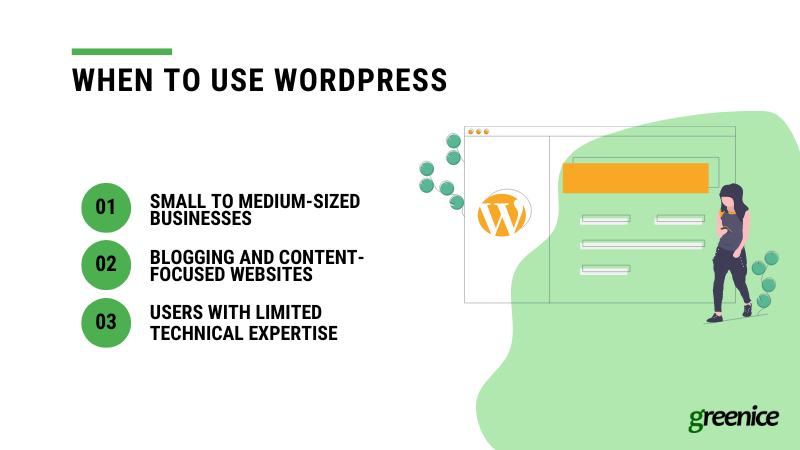
- Small to Medium-Sized Businesses: Ideal for its ease of use and affordability, WordPress is great for businesses needing a straightforward, professional website without complex development.
- Blogging and Content-Focused Websites: As a top platform for content creation, WordPress is perfect for blogs, news sites, and any content-centric websites.
- Users with Limited Technical Expertise: WordPress is accessible for non-tech-savvy users, offering a multitude of themes and plugins for easy customization.
When to use Laravel:
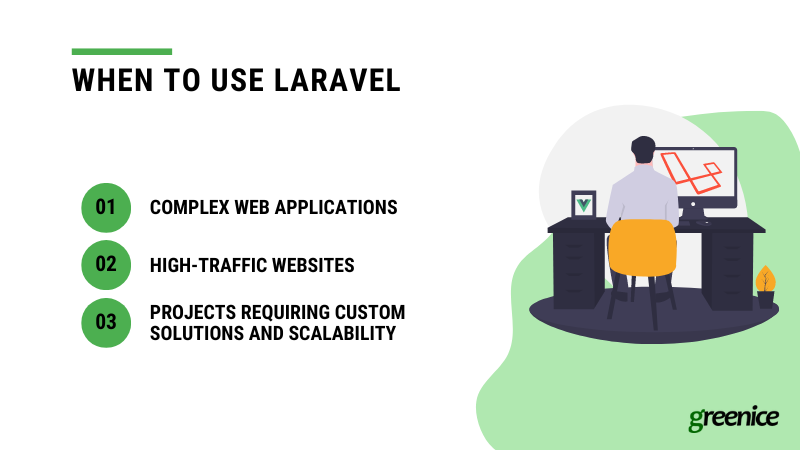
- Complex Web Applications: Laravel is tailored for intricate web applications requiring unique features, like social networks or advanced business tools.
- High-Traffic Websites: For handling substantial traffic without performance dips, Laravel's scalability and efficient database management are key.
- Custom Solutions and Scalability: For tailor-made features and growth potential, Laravel's flexible framework and integration capabilities make it a prime choice.
So… Laravel vs WordPress - which is better? Let’s sum up in the table:
| Criteria | WP | Laravel |
| Cost | Initially cheaper | More cost-effective in the long run |
| Ease of use | Easier to use | Requires tech knowledge |
| Security | Vulnerable | Secure |
| Performance | Good only for basic functionality | Fast, can handle complex functionality and more traffic |
| SEO | Offers built-in tools | Needs some extra measures to be SEO-friendly |
| Scalability | Not very scalable, adding more plugins leads to operation issues | Absolutely scalable |
| Reliability | Plugins can be incompatible and collide | Very reliable |
| eCommerce | Has WooCommerce plugin for eCommerce purposes | Can become whatever you want |
| When to use | For small and basic projects like blogs or online shops | For big projects with complex features |
While WordPress seems to be simple and user-friendly, its capabilities (especially in terms of security) are pretty limited. Laravel stands out for its scalability, security, speed, and flexibility, offering a better money-results ratio for complex, high-traffic, and customized web applications. So opt for Laravel when your project's scope and needs exceed the basic offerings of a standard CMS.
WordPress to Laravel Migration
Migrating from WordPress to Laravel can be beneficial for businesses outgrowing WordPress's capabilities. It requires careful planning and technical expertise but can significantly improve performance and scalability.
Here’s a brief overview of the key steps involved in this migration process:
- Plan and Analyze: Assess the current WordPress site's structure, features, and data. Determine the functionalities and features to be replicated or improved in Laravel.
- Set Up a Laravel Environment: Install Laravel and configure a development environment. Ensure server requirements and dependencies are met.
- Data Migration: Export data from WordPress (posts, pages, users, etc.). Design the database schema in Laravel and import the exported data.
- Recreate Functionality: Implement the website's features using Laravel's tools and packages. Pay special attention to replicating critical functionalities like user authentication, content management, and any custom features.
- Design and Front-End Development: Develop the front-end using Laravel's templating engine, Blade. Ensure the new design is responsive and matches the brand aesthetics.
- SEO and Redirects: Maintain URL structures or set up redirects to preserve SEO rankings. Implement SEO best practices in the Laravel application.
- Testing: Rigorously test the Laravel site for functionality, performance, and security. Ensure all features work correctly and data is displayed accurately.
- Migration of Assets: Transfer media files, such as images and documents, from WordPress to Laravel.
- Go Live: After thorough testing, deploy the Laravel site to the production server. Monitor the website post-launch for any issues.
- Post-Migration Support: Provide necessary support and maintenance for the new Laravel site. Monitor the site’s performance and make adjustments as needed.
Remember, migrating from WordPress to Laravel is a complex process that requires careful planning and execution, ideally involving experienced developers to ensure a successful transition.
Need help with website migration?
Our experience
Almost every our project is built with Laravel. And we can say for sure how good this option is. Here are just a couple of examples:

In this project, a sports photographer in the U.S. developed a Shutterstock-like website, serving as a photo marketplace where users can buy photos from sports events and receive printed versions. Originally built with WordPress and PhotoShelter, the site struggled with performance issues. Especially, in terms of scaling and automation possibilities.
To resolve this, the team maintained the user-friendly. WordPress front-end but overhauled the back-end by rebuilding it with Laravel. This change was aimed at boosting the site's performance and handling of complex tasks like payment processing more efficiently. The switch to Laravel provided the necessary robustness and scalability, crucial for the high-traffic, transaction-heavy nature of an online photo marketplace.
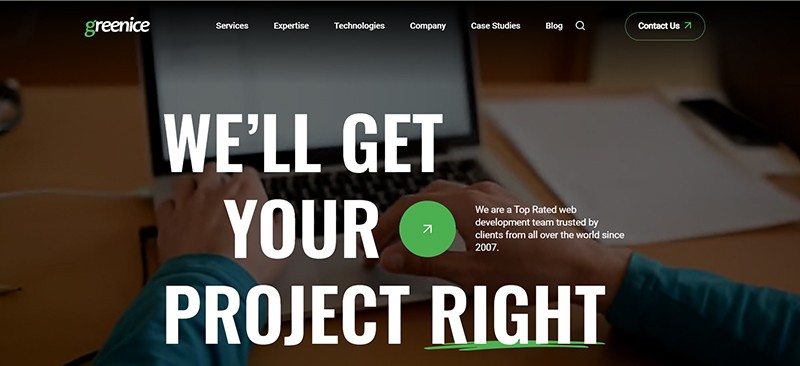
We initially launched our website using WordPress, but a security breach one month post-launch led us to migrate to Laravel. This transition markedly improved our website's security and performance. With Laravel, we experienced enhanced protection against threats, a stark improvement over the vulnerabilities we faced with WordPress.
Additionally, the site's performance saw a significant boost, with faster load times and smoother traffic handling. This shift to Laravel not only addressed our security issues but also greatly elevated our website's efficiency and overall user experience.
Conclusion
Comparing Laravel and WordPress for building a website involves looking at various criteria such as accessibility, speed, development complexity, SEO friendliness, and more. Each platform has its strengths and is suitable for different types of projects.
Laravel is more suited for custom, complex web applications where full control and flexibility are required. WordPress, on the other hand, is ideal for standard websites, blogs, and e-commerce sites where ease of use, community support, and quick deployment are prioritized. The choice “Laravel or WordPress?” will largely depend on the specific needs and goals of the website in question.
But if you are ready to start your journey toward success with Laravel - we are here to help.
Ready to start your Laravel project?
Rate this article!
5
 PHP Development
PHP Development Laravel
Laravel Yii
Yii


Comments (0)